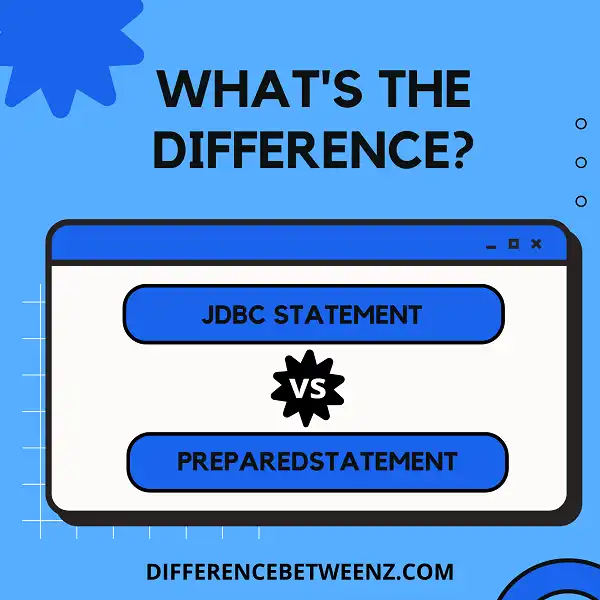The JDBC statement and the prepared statement are two different ways of executing queries. The JDBC statement is a direct way to execute a query, while the prepared statement is a way to prepare a query so that it can be executed multiple times. In this blog post, we will explore the differences between these two methods.
What is JDBC Statement?
- JDBC Statement is a component of JDBC (Java Database Connectivity) technology, which allows Java applications to connect to database servers and execute SQL statements.
- JDBC Statements are an object-oriented way of executing SQL queries on the database, bypassing the traditional method of writing raw SQL queries. JDBC Statements allow greater control over Prepared Statements, such as setting parameters and fetching results in the form of a table.
- JDBC Statements also help in reusing the same SQL query multiple times without having to parse them again and again, making it easier and faster for developers to quickly execute database commands.
What is PreparedStatement?
- PreparedStatement is an interface provided by the Java JDBC API that can be used to execute parameterized queries. PreparedStatements allow programmers to write code in a more efficient way while providing better performance and security at the same time.
- PreparedStatements inherently provide serious protection from SQL injection attacks since they are pre-compiled against a particular database, meaning only specific parameters can be used within the query.
- PreparedStatement objects in Java also streamline common queries because they can easily be reused, thereby reducing code complexity and improving the overall readability of an application’s codebase.
Difference Between JDBC Statement and PreparedStatement
JDBC Statement and PreparedStatement are both JDBC (Java Database Connectivity) objects used to interact with databases.
- JDBC Statements are generally used in cases where you need to execute multiple, dynamic SQL statements; they do not support any form of pre-compilation or parameter binding.
- Conversely, JDBC PreparedStatements are useful when working with a SQL statement that needs to be executed multiple times because they allow for such features as pre-compiling the SQL statement, reusing it, and parameter binding.
As a result, JDBC PreparedStatements typically provide greater performance than JDBC Statements when executing a single SQL statement repeatedly due to their ability to pre-compile and cache the compiled SQL statement.
Conclusion
The main difference between a JDBC statement and a prepared statement is that the latter can be reused multiple times, which makes it more efficient. By using prepared statements, you can avoid having to create new SQL statements for every request. This will save time and resources on your part. Prepared statements also help protect your application against SQL injection attacks.


